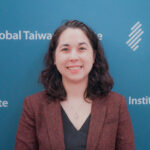Tuesday, June 24, 2025 from 12:00PM – 1:30PM (ET)
In-person and Webcast
Event Summary:
On June 24, 2025, the Global Taiwan Institute (GTI) hosted a public seminar entitled “Enhancing Taiwan’s Information Resilience: How Journalists can Counter Disinformation.” The discussion featured four panelists: Summer Chen, the founder of Taiwan-based initiative FactLink; Mary Ma, the head of investigation and research at FactLink; Shanthi Kalathil, founder and principal at MDO Advisors, a visiting senior fellow at the German Marshall Fund of the US, and a senior fellow with USC; and Min Mitchell, an independent analyst who formerly served as the Executive Editor at Radio Free Asia (RFA). GTI Senior Programs Manager Adrienne Wu moderated the event.
FactLink’s Summer Chen and Mary Ma started the panel by identifying three main threats to Taiwan’s information ecosystem: the rapidly rising quantity of AI-generated disinformation, malign actors’ ability to cover their tracks, and gray zone information operations. While not difficult to debunk in certain cases, the sheer amount of AI-generated videos polluting Taiwan’s information ecosystem strains the capacity of fact checkers. Meanwhile, disinformation actors have exploited Taiwan’s democratized media landscape to undermine fact-checking efforts. Increasingly, disinformation campaigns have pivoted their focus to planting bait on social media, where manipulated content is picked up by the press—whose freedom of expression is protected. Lastly, many information operations now occur in the “gray zone.” Recent disinformation campaigns—from false reports about Taipei City’s plan to fine motorcyclists who were caught without a face covering during the COVID-19 pandemic to the recent controversy surrounding Yaya, a Chinese spouse whose residency was revoked after she produced content promoting Taiwan’s armed reunification with China—seek to divide public opinion on Taiwan’s laws while distracting people from the PRC’s political and military advances.
After identifying Taiwan’s top challenges, Chen and Ma concluded their portion of the discussion with three recommendations for improving Taiwan’s information resilience: forming an AI-verifying community composed of tech experts and journalists; training journalists and educators in spotting disinformation; and collaborating with global partners to counter disinformation campaigns with regional ramifications.
To Min Mitchell, our third panelist, journalists are a frontline defense—the critical infrastructure of democratic resilience—when acting across borders, languages, and platforms. Speaking from her experience as a journalist in both Taiwan and the US, Mitchell identified three areas of cooperation to jointly address information challenges: cross-border investigative cooperation; training and exchange programs; and advocating for increased accountability and transparency from global tech platforms. First, coordinated influence operations can be weakened by cross-border media coalitions. Taiwan’s unique insight into the tactics of authoritarian regimes positions it as a key contributor to such collaborations. Civil society organizations, such as FactLink, and independent media outlets exemplify how Taiwan is verifying information, educating the public, and exposing coordinated influence operations by the PRC. Moreover, Taiwan’s unique civic tech community, led by young digital entrepreneurs like former Taiwan Digital Minister Audrey Tang (唐鳳), works hand in hand with journalists and other civil society organizations to respond to disinformation in real time and raise public awareness of misinformation across generations. The second area of collaboration, training and exchange programs, builds upon Chen and Ma’s idea of building an AI-verifying community. Existing international collaborations actively trace disinformation networks, while nonprofit organizations help build tools and standards to aid the public in distinguishing credible reporting from manipulated or AI-generated content. Future possibilities include co-hosted workshops, mentorship initiatives, and outside opportunities, such as a US-Taiwan disinformation reporting fellowship. Lastly, journalists can demand that global tech platforms take disinformation campaigns—especially those targeting Taiwan—more seriously and advocate for stronger transparency standards and localized content moderation.
Although Taiwan and the US may face different vulnerabilities, Mitchell believes that they ultimately share the same fight against disinformation. The Taiwanese and US media ecosystems both face historic public distrust in legacy media, increasingly digital and polarized democracies, and disinformation and echo chambers amplified by social media algorithms. However, Mitchell identified particular problems in Taiwan: most Taiwanese media do not have fact checkers and standards editors in their newsroom; and many young Taiwanese are being constantly exposed to surveillance and disinformation through Chinese-owned apps like Xiaohongshu (小紅書), Douyin (抖音, TikTok), and WeChat. These security risks enhance existing polarization and societal distrust to weaken Taiwan’s democratic institutions from within. Despite these vulnerabilities, from the creation of RFA’s Asia Fact Check Lab in 2022 to FactLink, journalists are actively collaborating to combat CCP information operations.
The event’s last speaker, Shanthi Kalathil concluded with several ideas about how to curtail the spread of PRC narratives in a more AI-dominated world. “PRC public opinion guidance” tactics range from the media to unofficial, casual information channels delivered through face-to-face interactions and by influencers. Beyond guiding public opinion, the PRC also attempts to manage the public discourse through censorship of sensitive topics. To counter this, Kalathil proposed that democracies like Taiwan can step up with their expertise and financial resources, and civil society can expand its role in information resilience. First, other democracies can fill in the gaps where independent media and fact-checking networks are struggling by providing funding and expertise, where Taiwan again takes a leading role. In addition to government initiatives, international networks and civil society organizations can foster exchange on building media literacy programs and more.
However, two recent changes have exacerbated the under-resourced and overlooked nature of the global information space: funding cuts to civil society efforts; and technological threats posed by artificial intelligence (AI) and large language models (LLMs). First, international fact-checking groups and small independent media outlets face a dearth of financial resources and institutional support, limiting their capacity against authoritarian powers. Second, expanding upon Chen and Ma’s warnings about deepfakes, the rise of AI goes hand-in-hand with the prevalence of LLMs. In particular, chatbots have revolutionized the online ecosystem—Kalathil predicted that PRC-developed LLMs will be even more important in the future, recalling how DeepSeek’s open-source, adaptable, and affordable features disrupted the tech world. Developing countries could take and adapt the model to their own purposes, where studies have found remnants of built-in information controls and PRC narratives. More countries, consumers, and citizens around the world may become reliant on the PRC’s models. At the same time, the transition from traditional search methods to a more AI- and LLM-driven information ecosystem represents another new concern that independent media and fact-checking networks must evolve to deal with.




